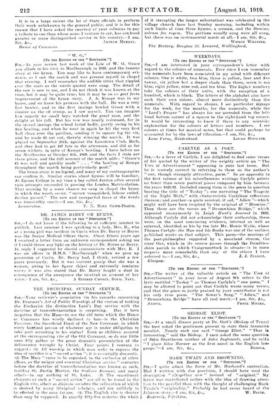CARLYLE AS A POET.
[To THE EDITOR OF THE " SPECTATOR."] SIR,—As a lover of Carlyle, I are delighted to find some verses of his quoted by the writer of the weighty article on " The Uses of Advertisement" appearing in your last issue. But he is scarcely correct in referring to them as the author's " one, though strangely attractive, poem." In an appendix to the first volume of his miscellaneous writings Carlyle prints no fewer than seven poetical pieces composed by him between the years 1823-33. Included among them is the poem in question bearing the title of " To-day "; one narrating " The Tragedy of the Night Moth," with characteristic Carlylean reflections thereon; and another—a quite musical, if sad, "Adieu "—which might well have been inspired by the original of " Blumine." Then there are the verses on " Drumwhinn Bridge," which appeared anonymously in Leigh Hunt's Journal in 1832. Although Carlyle did not acknowledge their authorship, these were, on the most convincing evidence, internal as well as external, identified as his by the late Mr. Howie Wylie, whose Thomas Carlyle: the Man and his Books was one of the earliest published works on that subject. This poem—the musings of the poet-philosopher suggested by a moorland stream, the river Orr, which in its course passes through the Dumfries- shire parish in which Craigenputtoek is situate—is in some respects more remarkable than any of the others I have


































 Previous page
Previous page